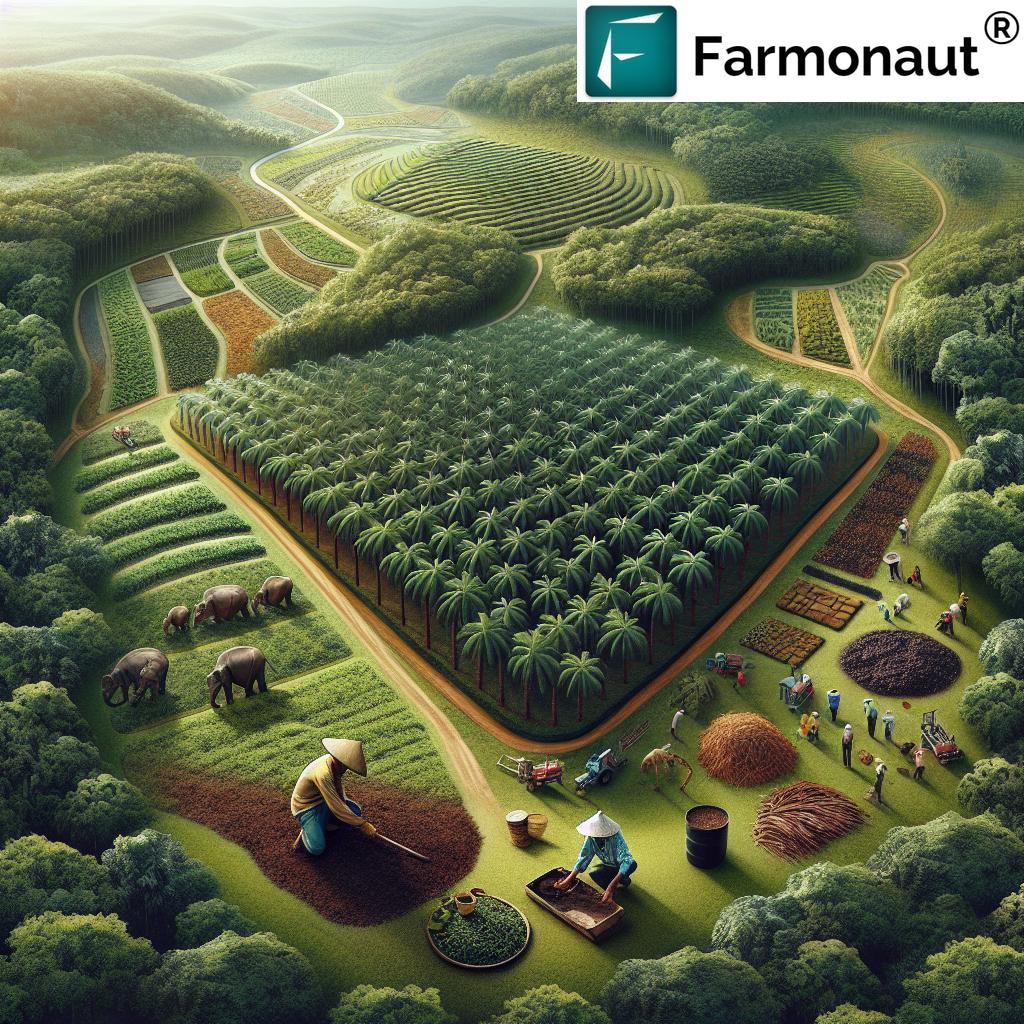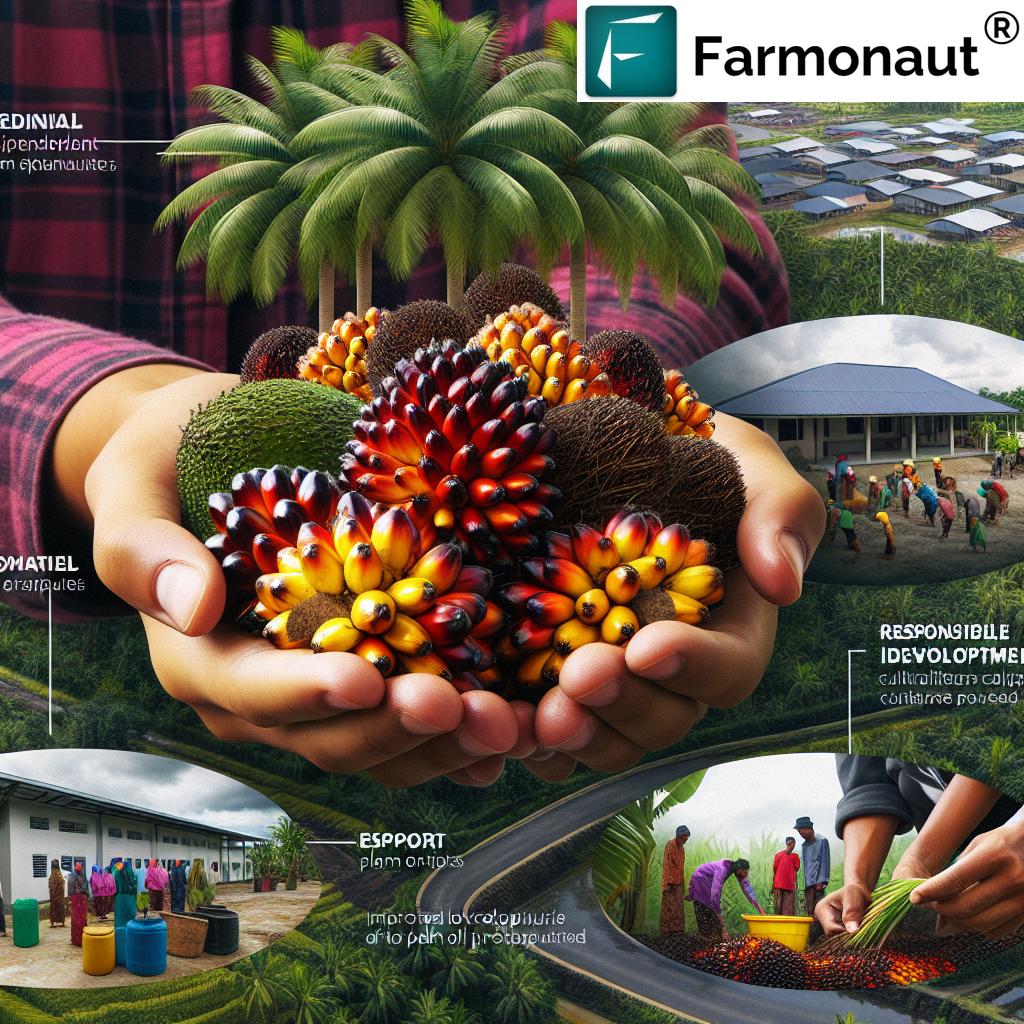Palm Oil Farmers: Malaysia’s Shocking Sustainability Secrets
“Over 85% of the world’s palm oil comes from Malaysia and Indonesia, impacting millions of smallholder farmers and rainforests.”
Table of Contents
- Introduction: Palm Oil, Malaysia, and the Environmental Impact
- Historical Context & Expansion of the Palm Oil Industry in Malaysia
- Economic Significance and Benefits of Palm Oil
- Challenges Facing Palm Oil Smallholders
- Social Impacts of the Palm Oil Industry in Malaysia & Indonesia
- Environmental Impacts: Deforestation and Palm Oil Plantations
- Sustainable Palm Oil Initiatives and the RSPO
- Regenerative Agriculture Practices in Palm Oil Cultivation
- Comparative Impact Table: Sustainable vs. Conventional Practices
- Farmonaut: Empowering Precision & Sustainable Agriculture
- Future Prospects for Sustainable Palm Oil in Southeast Asia
- FAQ: Palm Oil, Malaysia, and Sustainability
- Conclusion: The Pathway Forward for Palm Oil Farmers
Introduction: Palm Oil, Malaysia, and the Environmental Impact
Palm oil, a remarkably versatile vegetable oil derived from the fruit of the oil palm tree (Elaeis guineensis), lies at the heart of Malaysia’s agrarian identity and Southeast Asia’s global industry. Our daily food products, cosmetics, and even biofuels often depend on this commodity. Yet, behind the scenes, the environmental impact of palm oil cultivation and the experience of millions of smallholders reveal both untold challenges and opportunities for true sustainability.
In 2023–2024, Indonesia produced 44 million tonnes of palm oil, while Malaysia contributed 19.7 million tonnes, firmly placing both as leading producers. However, only around 19% of the global supply is sustainably certified, reflecting a pressing need for change within the industry.
“Sustainable palm oil certification covers only about 19% of global production, highlighting major environmental challenges in the industry.”
As we explore the roots, realities, and revolutions underway, our goal is to uncover Malaysia’s most shocking sustainability secrets: the real effects on environment, communities, and the very future of palm oil cultivation.
Why Is Palm Oil So Important?
- Ubiquitous: Key ingredient in more than half of supermarket products (from instant noodles to toothpaste).
- Economical: Highest yield per hectare among oil crops.
- Global Reach: Major export for producing countries and vital for economic growth.
Our Focus: Sustainability, Smallholders & the Southeast Asian Landscape
In this blog, we analyze the historical context of palm oil in Malaysia and Indonesia, the role of smallholder farmers, stark environmental and social problems, and the most promising solutions, including RSPO certification and regenerative agriculture practices. We also show how tools like Farmonaut’s satellite-based solutions are reshaping precision farming and traceability.
Historical Context & Expansion of the Palm Oil Industry in Malaysia
The story of palm oil in Southeast Asia is deeply tied to colonial introduction, major government diversification efforts, and the ever-increasing global appetite for versatile vegetable oils. Oil palm was introduced to Malaysia by the British in the 1870s, beginning as an ornamental plant and later, in 1917 (Selangor), morphing into large-scale cultivation.
- 1960s onward: Major government-driven programs encouraged the expansion of oil palm plantations. These moves aimed to lessen dependence on rubber and tin, fueling economic growth and rural development.
- By 2012: Malaysia had dedicated an impressive 5.1 million hectares to oil palm cultivation, positioning itself as a global leader.
Such rapid expansion improved Malaysia’s economies but also set the stage for profound environmental challenges—especially deforestation and biodiversity loss.
Economic Significance and Benefits of Palm Oil
The economic benefits of palm oil production in Malaysia and Indonesia cannot be understated. This commodity is a driver of national GDP, a vital source of employment, and a key element in global trade.
Major Economic Impacts:
- Job Creation: By 2012, approximately 491,000 workers were directly employed in Malaysia’s palm oil sector. Countless more are engaged indirectly in logistics, processing, and export.
- Development of Infrastructure: Expansion of plantations inevitably led to roads, better access to schools, healthcare, and other local services.
- Boost in Export Revenues: As a major global player, Malaysia leverages palm oil exports to bolster foreign exchange earnings, which has ripple effects across the wider Southeast Asian economy.
But Are All Farmers Benefiting Equally?
While the industry contributes to local economies, smallholder farmers often face distinct struggles. Income disparities, market access issues, and lack of training/opportunity for sustainable practices disproportionately affect independent producers.
Challenges Facing Palm Oil Smallholders
Palm oil smallholders, who manage less than 50 hectares, are crucial stakeholders for both production and sustainability. However, the road to sustainable palm oil for these independent farmers remains riddled with obstacles, particularly in Malaysia and Indonesia.
Key Challenges:
- Limited Access to Training: Most smallholders have insufficient resources, making access to sustainable agriculture training and modern inputs rare and expensive.
- Lack of Market Leverage: Smallholders often depend on intermediaries, who may take significant profit margins, lowering farm-gate prices and leaving smallholders vulnerable to market volatility.
- Low Certification Rates: By 2017, only around 1% of independent smallholder farms achieved RSPO certification and even fewer benefited from supply chain traceability.
- High Certification Costs: Audits, compliance measures, and training costs for attaining sustainability credentials regularly consume over 10% of annual income—unsustainable without external support.
This imbalance restricts not only the economic growth of smallholders but also limits industry-wide sustainability.
For smallholders seeking fairer access to financing, Farmonaut’s Crop Loan & Insurance Verification solution leverages satellite monitoring to streamline loan approvals and reduce fraudulent claims, delivering practical support to rural farmers.
Social Impacts of the Palm Oil Industry in Malaysia & Indonesia
Despite clear economic benefits, the palm oil industry in Malaysia and Indonesia has been criticized globally for persistent social issues.
Major Social Challenges Include:
- Land Disputes: Rapid expansion has led to conflicts between plantations and indigenous/local communities, especially around land rights and resource access.
- Exploitation of Workers: Labor concerns—such as underpayment, poor working conditions, and allegations of child labor—pose risks to the reputation and sustainability of the industry.
- Women & Vulnerable Groups: Women are often underrepresented in ownership and leadership within the industry, facing unique hurdles in accessing capital and fair pay.
Our commitment to ethical and sustainable palm oil must address these issues, ensuring that benefits of industry growth are more equitably distributed.
Environmental Impacts: Deforestation and Palm Oil Plantations
Perhaps the most alarming controversy surrounding palm oil is the environmental impact of deforestation and palm oil cultivation. Vast tracts of Southeast Asia’s biologically rich rainforests have been converted to farming hectares of oil palm, most notably in Malaysia and Indonesia. This transition brings with it profound ecological costs.
Key Environmental Issues:
- Biodiversity Loss: The conversion of rainforests into oil palm plantations destroys unique habitat for endangered species like the orangutan, Sumatran tiger, and numerous bird and insect species.
- Carbon Emissions: Clearing of forests, especially carbon-dense peatlands, releases significant amounts of greenhouse gases, offsetting the carbon sequestration potential of oil palm trees.
- Soil Degradation & Water Pollution: Monoculture cultivation depletes soil nutrients and increases erosion; heavy use of agrochemicals leads to run-off into local waterways.
While palm oil delivers the highest oil yield per hectare among major vegetable oils, it’s critical to ensure that these productivity gains do not devastate natural ecosystems.
To help monitor and reduce this environmental footprint, Farmonaut’s Carbon Footprinting platform provides real-time data on emissions. This empowers farmers, agribusinesses, and policymakers to track, benchmark, and systematically reduce their carbon emissions towards more sustainable palm oil production.
Sustainable Palm Oil Initiatives and the RSPO
Given these interconnected challenges, the introduction of sustainable palm oil standards and initiatives—most notably the Roundtable on Sustainable Palm Oil (RSPO)—marks a turning point in the industry.
What Is RSPO Certification?
- A voluntary, multi-stakeholder initiative created in 2004 to improve the environmental and social performance of global palm oil supply chains.
- Certifies plantations and products that meet criteria for sustainable agriculture, worker rights, and responsible land development.
- By 2016, 52 million metric tonnes of palm oil fruit were RSPO-certified, but most smallholders remain outside these frameworks.
Barriers Faced by Smallholders:
- Certification costs, which include training, audits, and compliance updates, can surpass 10% of annual smallholder incomes—creating a disparity in sustainable market participation.
- The promise of price incentives for sustainable palm oil rarely reaches independent smallholders, as middlemen or companies in the supply chain often capture the premium.
To truly scale sustainable practices, a focus on reducing the cost of certification, improving access to training, and ensuring equitable distribution of rewards is essential.
Blockchain is a transformative technology for traceability in the palm oil industry. Farmonaut’s Traceability platform uses blockchain to record every stage from plantation to consumer, boosting supply chain transparency and fostering consumer trust in certified sustainable palm oil.
Regenerative Agriculture Practices in Palm Oil Cultivation
In recent years, there has been a sharp pivot towards regenerative agriculture practices in Southeast Asia’s palm oil plantations. What sets regenerative models apart is their emphasis on biodiversity, soil health, and minimizing inputs—moving well beyond traditional sustainability certifications.
Core Principles of Regenerative Agriculture:
- Protecting High Carbon Stock Areas: Preservation of remaining rainforests and peatlands is prioritized to maintain vital ecosystem services.
- Promoting Biodiversity: Integrating a variety of plant species, agroforestry, and natural habitats within plantations helps regenerate soils and habitats.
- Reducing Chemical Use: Substitution of chemical fertilizers and pesticides with organic and biological alternatives improves environmental resilience.
- Community Engagement: These projects often place smallholders at the center, working to boost productivity while protecting the environment.
Leading examples of regenerative projects are emerging in places such as Aceh Tamiang, Sumatra, with goals to increase smallholder productivity by 30% and create sustainable sourcing districts. However, expanding these efforts to the national and global scales remains a challenge.
- Emissions Reporting: Reliable and transparent carbon accounting is mandatory for future proofing the industry against evolving environmental regulations.
- Farmonaut’s API provides programmable access to satellite-based sustainability metrics for agribusinesses and developers, making emissions and traceability data more accessible. See API Developer Docs for detailed integration guidelines.
The External Pressure of Global Markets
The European Union’s Deforestation Regulation (EUDR) now requires that companies provide evidence their products are “deforestation-free,” raising the bar for supply chain traceability. Unfortunately, this often leaves smallholders at risk of exclusion from premium global markets—or redirected to countries with weaker environmental standards.
Comparative Impact Table: Sustainable vs. Conventional Palm Oil Practices in Malaysia & Indonesia
This table helps us clearly visualize how sustainable palm oil practices compare to conventional methods, emphasizing the effects on environment, smallholders, yield, and market share. Estimated values & ranges are based on referenced studies and sector reports.
| Country | Practice Type | Deforestation Rate | Biodiversity Loss | Smallholder Benefits (Income/Support) | Yield per Hectare (tonnes/year) | Global Market Share (%) |
|---|---|---|---|---|---|---|
| Malaysia | Conventional | Moderate–High (esp. 1980–2010) | Significant loss (fragmented habitats) | Uneven, low support | 3.2–4.0 | ~25 |
| Malaysia | Sustainable (incl. RSPO/Regenerative) | Low (Zero deforestation pledges) | Preserved & restored biodiversity zones | Rising income/support via RSPO, certification | 4.0–5.0 | 6–7 |
| Indonesia | Conventional | Very High (largest contributor globally) | Critical loss (including peatlands) | Low, support often lacking | 3.1–3.8 | ~59 |
| Indonesia | Sustainable (incl. RSPO/Regenerative) | Declining (stronger enforcement, but challenges remain) | Buffer zones/forests conserved/restored | Gradual improvement, more support programs | 4.1–5.0 | 12–13 |
*Global market share estimates reflect fraction of sustainably certified palm oil under RSPO or similar schemes. Yields and impact indicators vary by plantation management, technological uptake, and external factors.
Key Takeaways from the Table
- Sustainable palm oil practices help reduce deforestation and biodiversity loss, with clear benefits for smallholder income and support programs.
- Yield per hectare is generally higher for sustainably managed plantations due to increased efficiency, training, and resilience.
- Malaysia and Indonesia must balance economic imperatives with increasing global pressure for sustainability to preserve market access.
Farmonaut: Empowering Precision & Sustainable Agriculture
No discussion about catalyzing sustainable palm oil would be complete without addressing breakthrough agricultural technology. At Farmonaut, our mission is to make precision agriculture affordable, actionable, and scalable for every farmer—from smallholders in Southeast Asia to the largest agribusinesses.
What Makes Farmonaut’s Platform Different?
-
Satellite-Based Crop Health Monitoring:
We analyze multispectral satellite images to reveal real-time crop health, soil moisture, and vegetation indices (NDVI), giving every plantation detailed diagnostic tools without expensive hardware. -
Jeevn AI Advisory System:
Through AI, we provide personalised farm advisory, weather forecasts, and actionable recommendations to help optimize yield, reduce risks, and improve sustainability. -
Blockchain Traceability:
Our innovative traceability platform is built on blockchain to support supply chain transparency. It ensures every palm oil fruit’s journey—from farm to end-product—is clear, fostering trust for certified sustainable palm oil. -
Fleet and Resource Management:
Plantation managers and agribusinesses use Farmonaut’s Fleet Management solutions for logistics, vehicle monitoring, and overall operational efficiency—vital for large-scale compliance and sustainability. -
Carbon Footprinting:
By offering carbon footprint tracking, we empower Malaysians and Indonesians in the palm oil industry to document, reduce, and ultimately neutralize their farming’s environmental impact.
How Do Farmers and Agribusinesses Benefit?
- Cost-Effectiveness: No need for expensive IoT/sensor hardware—just data-driven precision at your fingertips.
- Increased Productivity: Real-time data enables informed decisions about irrigation, pest management, fertilizer, and harvest scheduling.
- Sustainability & Compliance: Farmers can easily monitor and adapt practices to align with evolving global sustainability requirements and certifications.
- Transparency: Secure blockchain systems enhance consumer trust and satisfy regulatory scrutiny with auditable traceability.
- Scalability: From 1 hectare to 10,000+, our tools grow with your needs.
Discover advanced plantation, forest and crop monitoring with Farmonaut’s Crop, Plantation & Forest Advisory Platform. It supports all types of palm plantations and supports transition from conventional to sustainable models.
“Sustainable palm oil certification covers only about 19% of global production, highlighting major environmental challenges in the industry.”
Future Prospects for Sustainable Palm Oil in Southeast Asia
The journey towards a truly sustainable palm oil industry Malaysia and Indonesia is far from over, yet hundreds of thousands of farmers, consumers, and companies are already investing in innovative pathways.
What Does the Future Hold?
-
Stricter Supply Chain Transparency:
Market access for palm oil products will increasingly depend on demonstrable proof of zero-deforestation, traceable sourcing, and carbon-conscious cultivation and development. -
Technology-Driven Change:
Satellite & AI-based management apps will become a norm in large and small plantations, slashing inefficiencies, reducing waste, and helping managers align with global sustainability standards. -
Greater Empowerment of Smallholders:
Affordable advisory, financing, and yield-improvement programs—like those enabled by Farmonaut—are expected to close the gap between large producers and rural farmers. -
Increasing Need for Regenerative Practices:
With climate change intensifying, only the most resilient, biodiversity-driven, and resource-efficient practices will ensure palm oil’s ongoing viability. -
Changing Regulations:
National policies (such as Malaysia’s state-led RSPO enforcement) and international rules (like the EU’s EUDR) will put increasing pressure on the industry to reform.
Swift adaptation, collaboration, and support for independent smallholders will shape both the market bonuses and environmental legacies of palm oil from Malaysia and Indonesia.
FAQ: Palm Oil, Malaysia, and Sustainability
-
Q1: What is palm oil used for?
A: Palm oil is found in everyday food products, cosmetics, cleaning agents, and biofuels. Its applications span cooking oil, processed foods, ice cream, shampoo, soap, and as an ingredient for biodiesel. -
Q2: Who are palm oil smallholders and why are they important?
A: Smallholders are independent farmers with less than 50 hectares. In Malaysia and Indonesia, they produce a major portion of palm oil and are central to both the industry’s economic success and the pursuit of sustainability. -
Q3: Why is palm oil controversial for the environment?
A: Palm oil environmental impact includes rapid deforestation (especially in rainforests/peatlands), habitat loss for endangered species, and high carbon emissions due to land conversion. -
Q4: What does RSPO certification mean?
A: RSPO certification shows that palm oil is sustainably produced, meeting standards for forest conservation, worker rights, and reduced environmental harm. -
Q5: Are there any solutions or technologies supporting sustainable palm oil?
A: Yes. Satellite monitoring, precision advisory, blockchain traceability, and carbon tracking—as used by Farmonaut—help all actors from farmers to companies align with sustainability expectations. -
Q6: What is regenerative agriculture?
A: These are practices that restore soil, conserve biodiversity, and build resilient agroecosystems—helping ensure oil palm can be productive without degrading the environment. -
Q7: Can buying certified sustainable palm oil make a difference?
A: Absolutely! Supporting certified sustainable palm oil encourages more farmers and companies to adopt eco-friendly practices and helps drive long-term positive change. -
Q8: How much palm oil production is actually sustainable?
A: As of 2024, only about 19% of all palm oil produced globally is sustainably certified. Most smallholders remain outside these programs due to cost and access challenges. -
Q9: How can digital technology improve the palm oil supply chain?
A: With solutions like Farmonaut’s blockchain-based traceability, complete transparency and quick verification are possible—helping companies comply with regulations and empowering informed consumer choices.
Conclusion: The Pathway Forward for Palm Oil Farmers
The palm oil industry Malaysia and Indonesia is both an engine of economic progress and a flashpoint for environmental and social reform. As we’ve uncovered, challenges of palm oil cultivation—from rampant deforestation and labor exploitation to the exclusion of independent smallholders—are countered by mounting initiatives: sustainability certifications, regenerative agriculture, inclusive financing, and traceability powered by cutting-edge digital platforms.
Our journey now depends on a few key steps:
- Supporting policies and programs bringing the benefits of sustainable palm oil to every producer, from the smallest farm to the largest company.
- Embracing and scaling regenerative agriculture practices—putting biodiversity, carbon sequestration, and community participation at the heart of oil palm development.
- Utilizing technology such as Farmonaut’s AI, satellite, and blockchain-driven farm management tools—helping all actors increase productivity, profit, and sustainability.
- Ensuring transparency, traceability, and inclusive market opportunities in the face of evolving global regulation.
In our hands lies not only the world’s supply of a critical plant oil, but also the long-term well-being of Malaysian and Indonesian farmers, rainforests, and the global environment.
Start your journey to smarter, more sustainable palm oil farming. Experience Farmonaut now.












